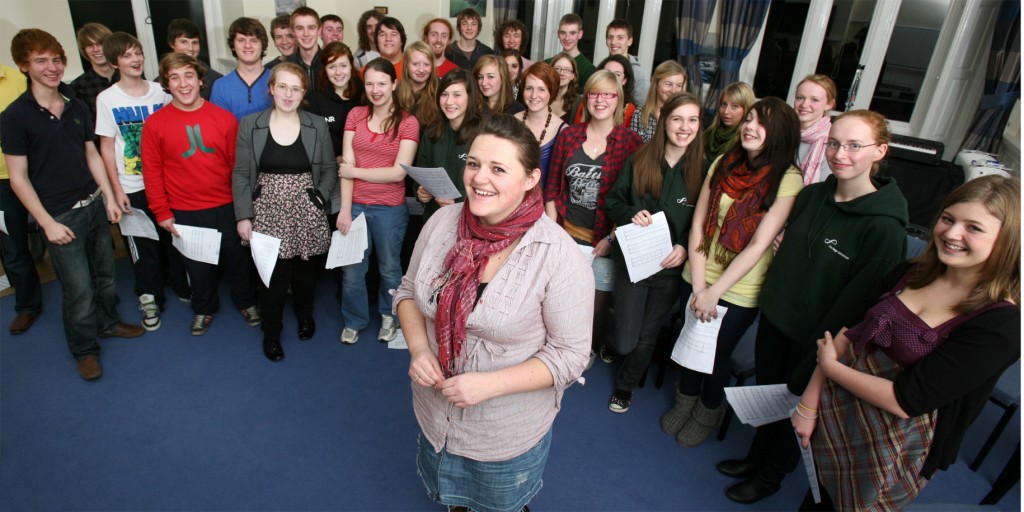Research from Goldsmiths University recently suggested that wealthier people are more musical. While it’s obvious that higher income families find it easier to stump for private piano lessons and expensive instruments, music has a place in boosting inclusion and there are some great community-based projects that not only make music more accessible, but aim for social impact in the process.
Take the Sage Gateshead, which is halfway through a four-year cultural exchange scheme with a Brazilian government programme called Santa Marcelina Cultura (Santa Marcelina Cultura manages São Paulo state government’s music education and cultural inclusion project – Projeto Guri). The project aims to improve arts education and boost social inclusion in both Sao Paulo and the North East.
The scheme is funded by the British Council’s transform arts and creativity programme. The Sage’s musicians and teachers have travelled to Sao Paulo to find out how music, learning and social inclusion are combined in Brazil, while a Brazilian team came to the North East last year. Below, two participants – one from each country – explain the benefits of their innovative musical scheme:

Kathryn Davidson, 29, from Fenham, Newcastle, folk strand leader, learning and participation, Sage Gateshead
“We’re about to enter the second leg of the second year of the project. Each visit is around two weeks long and involves observing practice, learning from each other, sharing ideas around social pedagogy and music education, and teaching. The two weeks are incredibly intense and informative.
For me, the first leg in 2012 was about getting to know Guri and what they do and weighing that up next to what we do. There are many differences but also many similarities in our own teaching styles but there is always the underlying theme that everyone deserves high quality music education. I was very proud when the Guri team came to Gateshead, I was proud to ‘show off’ the Learning and Participation department. The second trip to Sao Paulo was where I really began to understand my role and understand how the music that I teach and that I love is relevant.
We had a ceilidh for over 200 Guri young people and in the run up, the Guri staff reflected that they don’t use much, if any, Brazilian folk music. Much of it disappeared when the Portuguese invaded, and the post Portuguese music is often full of religion. What some people said is that seeing how British folk music can be used to teach rhythm, pulse, work in choirs, to teach intervals, to be a story for no other reason than to sing a good story, will make them investigate further their own traditions.
The ceilidh was my most favourite moment of both my times in Sao Paulo. My Brazilian colleague Paulo and I co-led this ceilidh even though he has never ‘called’ ceilidh dancing before and I speak minimal Portuguese! We had a ceilidh band made up of Sage Gateshead musicians and we had guest spots from some of the youth groups that we’d been working with… a wind band of young Brazilian musicians on saxophone and horns playing traditional Northumbrian music. Over a cold beer afterwards we all reflected that our own traditions are so close that they are normal, they’re ordinary. Placing the ordinary in an extraordinary context allows it to be fresh again.
The main challenges are in the circumstances that the young people who come to Guri live in. The Guri social team, who are absolutely outstanding, work with each and every young person to enable them to get the best from their learning, to fully engage with the programme. Sometimes that means holding their place for them for a few weeks whilst they have time to deal with the outside world. Sometimes it can take the social team visiting their home and working with their family, and sometimes it can be as simple as making sure they’ve had a good meal in their stomachs so that they can concentrate.
Often these young people will travel three hours to Saturday rehearsals, their transport is paid for and they receive meals and snacks to sustain them. Sao Paulo is a wonderful city but like all cities it is full of contrast, of huge wealth and incomprehensible poverty.
My own personal learning was huge, from trusting the music that I am passionate about to my confidence in my own teaching. Lots of the wider learning is still on-going, ‘what is a democratic music education?’ has become the research question. Both Sage Gateshead and Guri Santa Marcelina promote social inclusion and help people from different background to mix. How many Brazilian teenagers get the chance to work with a group of musicians from the North of England?
How many teenagers from Gateshead get the chance to work with musicians from Brazil? But it’s more than social inclusion, it’s about the promotion of social mobility and the belief that if you seize the opportunities offered to you, and you work hard, then there is no reason that you can’t succeed. If we can instill that within music education, be that in the formal classroom or in an out of school club, then that learning stays with the young person and seeps in to their self belief in English or Maths and they believe that if they set their mind to it and work hard they can accomplish anything.”

“I am currently enrolled as a music student at Guri Santa Marcelina (GuriSM) education programme and member of GuriSM Youth Choir, an auditioned choir in the institution. The Sage Gateshead team was invited to work with GuriSM Youth Choir in October last year.
The exchange project between GuriSM and Sage Gateshead is focused on “what is a democratic and inclusive music education?” and also involves many diverse activities like workshops, seminars and performances. A real highlight for me was when we held and took part in a Ceilidh dance. There were so many people and so many English tunes. I really felt as if I was over here in a traditional English Ceilidh.
During the exchange I have found the most challenging moments the discussions around democratic and inclusive music education, particularly around the questions of what it is and how to promote it? It is a very emotive subject and you can explore it very deeply. It was also the first times students had participated in discussions about education in Guri Santa Marcelina. The size of both projects (Guri Santa Marcelina and Sage Gateshead) means the subject and the work that goes on is much more complex than I thought. However, this complexity drives both institutions to look for solutions and not give up.
Projects like this foster the contact among people of different backgrounds. With such contact I believe the horizons broaden; and this encourages inclusion to take place.
I believe that this sort of music exchange between great partners brings about knowledge of culture from different places. I think collectively it can better inform citizens than if you are trying to do it by yourself. It is much more than just entertainment!
One of the moments that sticks in my head is that one day Ed Milner, head of music learning at Sage Gateshead, was on the bus with all of us students and we asked him what he had enjoyed the most. He answered “You all!”
It has been an amazing, life-changing experience.”
